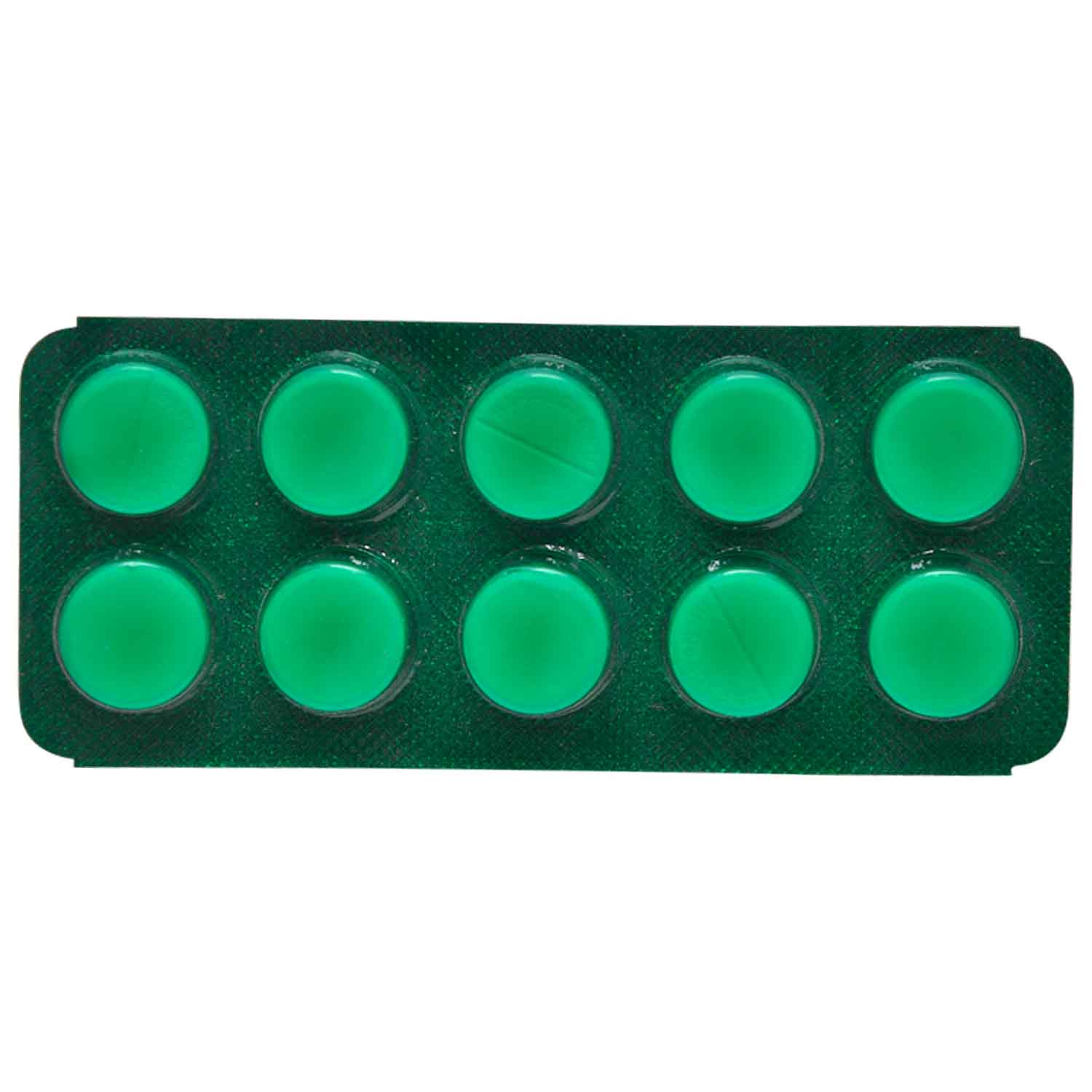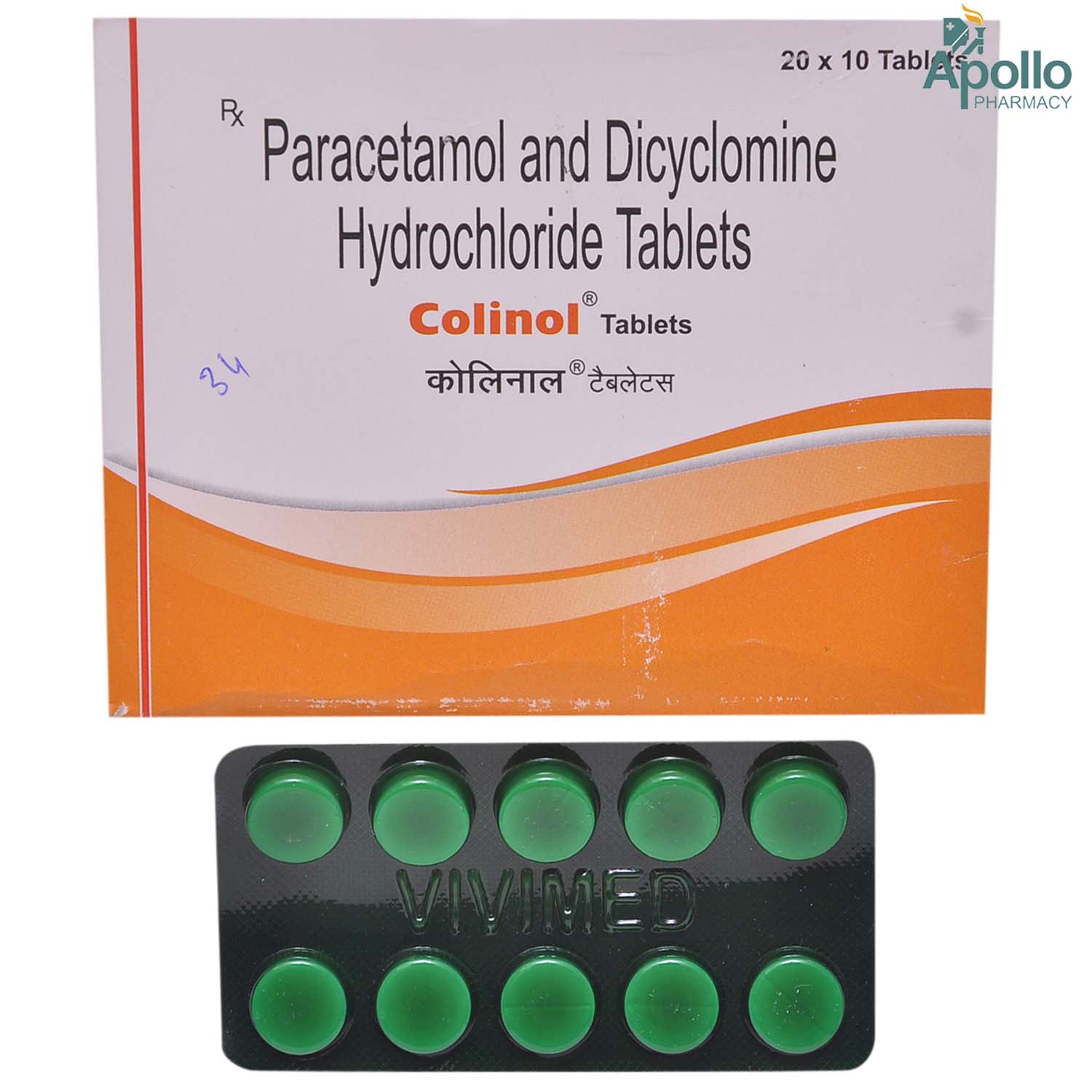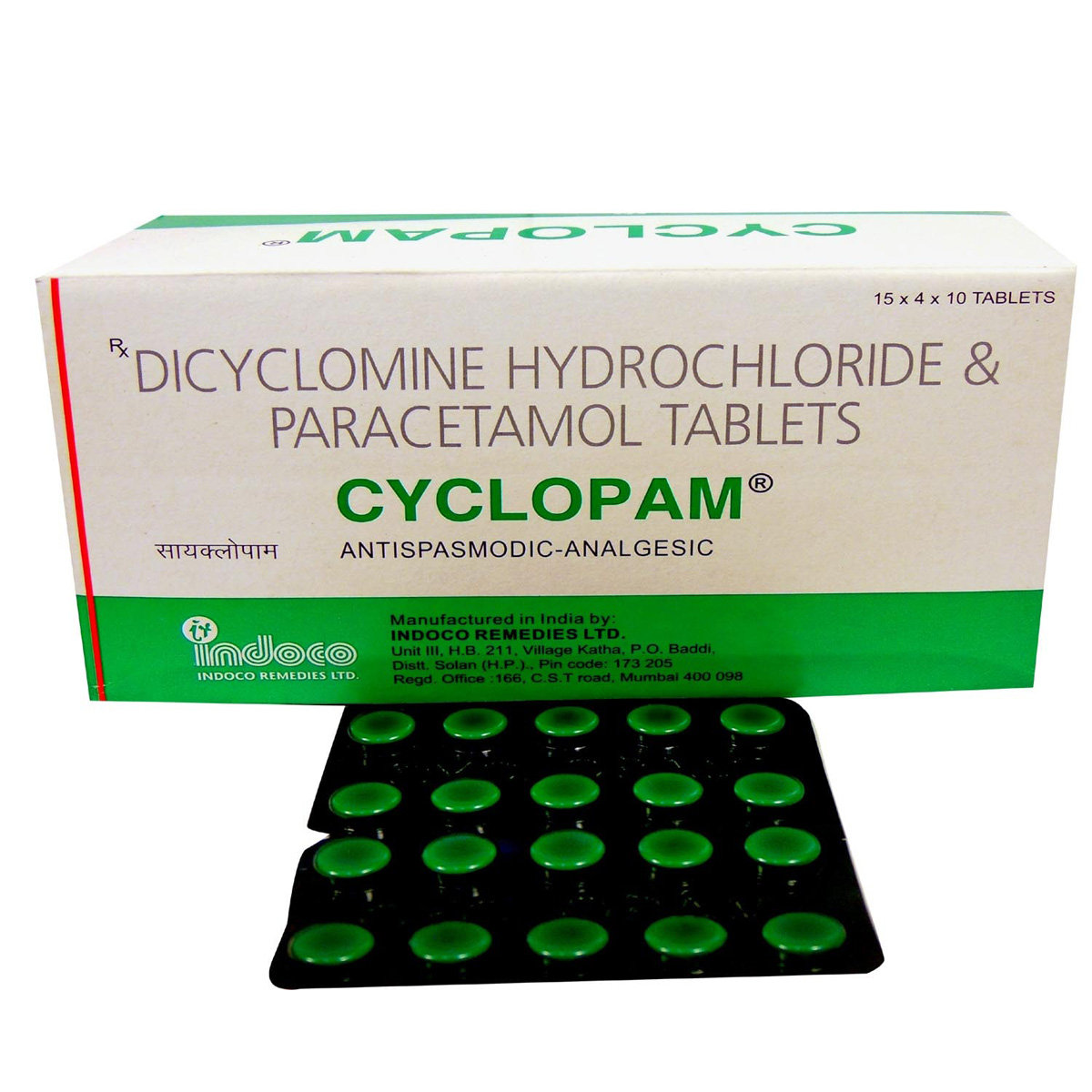Cyclopride 20 mg/500 mg Tablet
MRP ₹21.15
(Inclusive of all Taxes)
₹3.2 Cashback (15%)
Provide Delivery Location
Online payment accepted
 Prescription drug
Prescription drugWhats That
Composition :
Manufacturer/Marketer :
Consume Type :
Return Policy :
About Cyclopride 20 mg/500 mg Tablet
Cyclopride 20 mg/500 mg Tablet is a combination drug primarily used in the treatment of spasmodic pain and discomfort due to biliary colic, intestinal colic, renal colic and spasmodic dysmenorrhea (painful irregular periods). It also helps alleviate the symptoms of irritable bowel syndrome (IBS). Colic is the intensive and uncontrollable crying in the babies for a prolonged period for no certain reason. Dysmenorrhea (Abdominal cramps) is an unpleasant sensory and emotional experience associated with irregular periods. It occurs just before or during menses. Irritable bowel syndrome is an intestinal disorder that causes stomach pain, wind, constipation, and diarrhoea.
Cyclopride 20 mg/500 mg Tablet is composed of two medicines: Dicyclomine (antispasmodic/anticholinergic agent) and Paracetamol (analgesic). Dicyclomine/Dicycloverine helps in blocking the activity of certain natural substances that are responsible to cause pain. Paracetamol has both analgesic (pain reducer) and antipyretic (fever reducer) properties, which also decreases inflammation.
Your doctor will decide the dose and duration based on the severity of your pain. Common side effects of Cyclopride 20 mg/500 mg Tablet include experience dizziness, nausea (feeling sick), digestion problems like constipation, flatulence, diarrhoea, and skin reactions like rashes, hives. Most of the side effects of Cyclopride 20 mg/500 mg Tablet do not require medical attention and gradually resolve over time. However, if the side effects are persistent, reach out to your doctor.
Let your doctor know if you are sensitive or allergic to Cyclopride 20 mg/500 mg Tablet or any other medications. Before using Cyclopride 20 mg/500 mg Tablet, let your doctor know if you have liver, kidney or heart diseases, and any other medical history. Some antacids may inhibit the absorption of Cyclopride 20 mg/500 mg Tablet, hence consult your doctor. Cyclopride 20 mg/500 mg Tablet may cause dizziness, hence do not drive or operate machinery until you feel better. Pregnant and breastfeeding women should consult their doctor before using Cyclopride 20 mg/500 mg Tablet. Cyclopride 20 mg/500 mg Tablet should be used in children only when recommended by a doctor.
Uses of Cyclopride 20 mg/500 mg Tablet
Directions for Use
Key Benefits
Cyclopride 20 mg/500 mg Tablet is composed of two medicines namely: Dicyclomine (antispasmodic) and Paracetamol (mild analgesic and fever reducer). Cyclopride 20 mg/500 mg Tablet helps relieve spasmodic pain and discomfort due to biliary colic, intestinal colic, renal colic, and spasmodic dysmenorrhea (painful irregular menses/periods). Dicyclomine helps in blocking the activity of certain natural substances in the body responsible for causing pain. On the other hand, Paracetamol has analgesic (pain reducer) and antipyretic (fever reducer) properties, decreasing inflammation. Together, they effectively reduce pain and inflammation in conditions of intestine inflammation, spasm and painful menstruation.
Storage
- Inform your doctor about the nausea and discuss possible alternatives to the medication or adjustments to the dosage.
- Divide your daily food intake into smaller, more frequent meals to reduce nausea.
- Opt for bland, easily digestible foods like crackers, toast, plain rice, bananas, and applesauce.
- Avoid certain foods that can trigger nausea, such as fatty, greasy, spicy, and smelly foods.
- Drink plenty of fluids, such as water, clear broth, or electrolyte-rich beverages like coconut water or sports drinks.
- Use ginger (tea, ale, or candies) to help relieve nausea.
- Get adequate rest and also avoid strenuous activities that can worsen nausea.
- Talk to your doctor about taking anti-nausea medication if your nausea is severe.
- Record when your nausea occurs, what triggers it, and what provides relief to help you identify patterns and manage your symptoms more effectively.
- Inform your doctor about dry mouth symptoms. They may adjust your medication regimen or prescribe additional medications to manage symptoms.
- Drink plenty of water throughout the day to help keep your mouth moist and alleviate dry mouth symptoms.
- Chew sugar-free gum or candies to increase saliva production and keep your mouth moisturized.
- Use saliva substitutes, such as mouthwashes or sprays, only if your doctor advises them to help moisturize your mouth and alleviate dry mouth symptoms.
- Avoid consuming smoking, alcohol, spicy or acidic foods, and other irritants that may aggravate dry mouth symptoms.
- Schedule regular dental check-ups to keep track of your oral health and handle any dry mouth issues as they arise.
- Inform your doctor about dizziness symptoms. They may adjust your medication regimen or prescribe additional medications to manage symptoms.
- Follow your doctor's instructions for taking medication, and take it at the same time every day to minimize dizziness.
- When standing up, do so slowly and carefully to avoid sudden dizziness.
- Avoid making sudden movements, such as turning or bending quickly, which can exacerbate dizziness.
- Drink plenty of water throughout the day to stay hydrated and help alleviate dizziness symptoms.
- If you're feeling dizzy, sit or lie down and rest until the dizziness passes.
- Track when dizziness occurs and any factors that may trigger it, and share this information with your doctor to help manage symptoms.
- Consume more fruits, vegetables, and cruciferous foods like cabbage, kale, and broccoli.
- Reduced alcohol intake can enhance liver enzyme function.
- Oxidative stress can be managed by eating foods rich in antioxidants, such as vitamins C and E.
- Liver function tests regularly can help manage increased levels of AST.
- Drink water or other clear fluids.
- To prevent worsening of pain, limit intake of tea, coffee, or alcohol.
- Include bland foods like rice, toast, crackers, and rice in your diet.
- Avoid lying down immediately after eating as it may cause indigestion or heartburn.
- Avoid acidic and spicy food as it may cause indigestion.
- Include iron-rich foods like dark leafy vegetables, lean red meat, legumes and fish in your diet.
- Consume vitamin C-rich foods as they aid iron absorption.
- Limit tea, cocoa, and coffee as these can slow iron absorption.
- Exercise regularly; however, do not overdo it.
Drug Warnings
Let your doctor know if you are sensitive to Cyclopride 20 mg/500 mg Tablet or its components. Cyclopride 20 mg/500 mg Tablet should be used with caution and only under a doctor’s supervision if you have stomach/intestinal problems and diarrhoea due to intestine surgeries like ileostomy and colostomy. Pregnant and breastfeeding women should use Cyclopride 20 mg/500 mg Tablet with proper consultation and caution. Cyclopride 20 mg/500 mg Tablet may cause blurry vision and dizziness affecting your mental focus, hence do not drive or operate machinery until you feel better. Drinking alcohol may worsen the side effects; therefore, it is advised to avoid the alcohol intake while using Cyclopride 20 mg/500 mg Tablet. Cyclopride 20 mg/500 mg Tablet should be used in children only when prescribed by the doctor.
Drug-Drug Interactions
Drug-Drug Interactions
Login/Sign Up
Taking Cyclopride 20 mg/500 mg Tablet and Potassium citrate together can increase the risk of stomach ulcers, bleeding, and gastrointestinal injury.
How to manage the interaction:
Taking Cyclopride 20 mg/500 mg Tablet with Potassium citrate is not recommended, as it may lead to an interaction, it can be taken if prescribed by the doctor. However, if you experience severe stomach pain, bloating, sudden lightheadedness or dizziness, nausea, vomiting (especially with blood), decreased hunger, or dark, tarry stools, consult the doctor immediately. Do not discontinue any medications without a doctor's advice.
Co-administration of Pramlintide with Cyclopride 20 mg/500 mg Tablet can increase the risk of reduced gastrointestinal movement.
How to manage the interaction:
Taking Cyclopride 20 mg/500 mg Tablet with Pramlintide is not recommended, please consult your doctor before taking it. Do not discontinue the medication without consulting a doctor.
Co-administration of Cyclopride 20 mg/500 mg Tablet with Potassium chloride can increase the risk of stomach ulcers.
How to manage the interaction:
Taking Cyclopride 20 mg/500 mg Tablet with Potassium chloride is not recommended, as it can lead to an interaction, it can be taken if a doctor has prescribed it. However, if you experience severe stomach pain, bloating, sudden lightheadedness or dizziness, nausea, vomiting (especially with blood), decreased hunger, dark, tarry stools, consult the doctor immediately. Do not discontinue the medication without consulting a doctor.
Co-administration of Cyclopride 20 mg/500 mg Tablet may decrease the excretion rate of Oxazepam which could result in a higher serum level.
How to manage the interaction:
Although there is a possible interaction between Oxazepam and Cyclopride 20 mg/500 mg Tablet, you can take these medicines together if prescribed by a doctor. Do not stop using any medications without a doctor's advice.
Co-administration of ketamine and Cyclopride 20 mg/500 mg Tablet may decrease the effectiveness of Ketamine which could result in a higher blood level.
How to manage the interaction:
Although taking Ketamine and Cyclopride 20 mg/500 mg Tablet together can evidently cause an interaction, it can be taken if a doctor has suggested it. If you're feeling very sleepy or having trouble breathing, it's important to contact your doctor right away. Do not stop using any medications without a doctor's advice.
Co-administration of Teriflunomide with Cyclopride 20 mg/500 mg Tablet may increase the risk or severity of Liver problems.
How to manage the interaction:
Taking Cyclopride 20 mg/500 mg Tablet with Teriflunomide together can possibly result in an interaction, but it can be taken if a doctor has advised it. Do not discontinue any medications without consulting a doctor.
Co-administration of Cyclopride 20 mg/500 mg Tablet and Ketoconazole may increase the risk of liver injury.
How to manage the interaction:
Although there is a possible interaction between Cyclopride 20 mg/500 mg Tablet and Ketoconazole, you can take these medicines together if prescribed by a doctor. However, if you have joint pain or swelling, fever, chills, unusual bleeding or bruising, skin rash, itching, over-tiredness, nausea, vomiting, loss of appetite, stomach pain, dark-colored urine, light-colored stools, and/or yellowing of the skin or eyes, contact a doctor immediately as these may be signs and symptoms of liver damage. Do not discontinue the medication without consulting a doctor.
Co-administration of Cyclopride 20 mg/500 mg Tablet and Leflunomide may increase the risk of liver problems.
How to manage the interaction:
Although there is a possible interaction between Cyclopride 20 mg/500 mg Tablet and Leflunomide, they can be taken together if prescribed by a doctor. However, if you experience fever, chills, joint pain or swelling, unusual bleeding or bruising, skin rash, itching, less desire to eat, fatigue, nausea, vomiting, abdominal pain, or yellowing of the skin or eyes, contact a doctor immediately. Do not discontinue any medications without consulting a doctor.
Co-administration of Cyclopride 20 mg/500 mg Tablet and Valdecoxib may increase the risk or severity of adverse effects.
How to manage the interaction:
Although there is a possible interaction between Cyclopride 20 mg/500 mg Tablet and Valdecoxib, you can take these medicines together if prescribed by a doctor. However, if the side effects worsen, please consult a doctor.
Co-administration of Lomitapide and Cyclopride 20 mg/500 mg Tablet may increase the risk of severity of liver injury.
How to manage the interaction:
Although there is a possible interaction between Cyclopride 20 mg/500 mg Tablet and Lomitapide, you can take these medicines together if prescribed by a doctor. Do not stop using any medications without a doctor's advice.
Drug-Food Interactions
Drug-Food Interactions
Login/Sign Up
Diet & Lifestyle Advise
- Avoid or limit the intake of alcohol and caffeine.
- Manage stress, eat healthily, drink plenty of water, exercise regularly, and get plenty of sleep.
- Limit taking high fibre foods, foods and drinks that contain chocolate, alcohol, caffeine, fructose, or sorbitol, carbonated drinks, fried, and fatty foods.
- Do not have large meals at a time, instead try having small and simpler meals at regular intervals, including fresh fruits and vegetables in your diet.
- Practice yoga and recreation techniques to manage your emotional stress.
- If you are lactose intolerant, avoid using dairy products since it can worsen your IBS.
- If you cannot take dairy products, it is advised to include other calcium-rich foods like leafy greens, beans, nuts, and seeds.
- Drink plenty of fluids and dress lightly to prevent heatstroke and dehydration.
- Avoid overly sweating activities like hard exercises and using hot tubs.
Side Effects of Cyclopride 20 mg/500 mg Tablet
- Dizziness
- Nausea (feeling sick)
- Constipation
- Flatulence
- Diarrhoea
- Rashes/hives
Habit Forming
Therapeutic Class
All Substitutes & Brand Comparisons
RX
Out of StockAcispam 20mg/500mg Tablet
₹4
(₹0.36 per unit)
81% CHEAPERRX
Out of StockBerberal 20 mg/500 mg Tablet
Alembic Pharmaceuticals Ltd
₹7.5
(₹0.68 per unit)
64% CHEAPERRX
Out of StockBrenum P 20 mg/500 mg Tablet
Gujarat Terce Laboratories Ltd
₹9
(₹0.81 per unit)
57% CHEAPER
Drug-Diseases Interactions
Drug-Diseases Interactions
Login/Sign Up
FAQs
Drug-Drug Interactions Checker List
- CHOLESTYRAMINE
- DOMPERIDONE
- ZIDOVUDINE
- WARFARIN
- TACROLIMUS
- METHOTREXATE
- POTASSIUM CITRATE
Disease/Condition Glossary
Colic: Colic is the intensive and uncontrollable crying in the babies for a prolonged period for no certain reason. Colicky babies usually have distended bellies, release gas, raise their legs to the chest, and bend or arch their backs.
Irritable Bowel Syndrome (IBS): It is also termed as IBS colitis, mucous colitis, spastic colon, nervous colon, and spastic bowel. It is an inflammatory bowel disease that affects the large intestine. Symptoms of an IBS include abdominal pain, bloating, diarrhoea, mucus in stools, wind, constipation, tiredness, anxiety, depression, heartburn, indigestion, and headaches.
Dysmenorrhea refers to abdominal cramps/pain and an unpleasant sensory/emotional experience associated with irregular periods. It occurs just before or during menses.

Have a query?
Alcohol
Safe if prescribed
It is advised to limit alcohol intake to prevent any undesirable side effects of Cyclopride 20 mg/500 mg Tablet and further worsen your disease. Please consult your doctor before using Cyclopride 20 mg/500 mg Tablet.
Pregnancy
Consult your doctor
Cyclopride 20 mg/500 mg Tablet should be used during pregnancy only if potential benefit over weigh potential risk to fetus.
Breast Feeding
Consult your doctor
Please seek medical advice if you are a breastfeeding mother before starting Cyclopride 20 mg/500 mg Tablet.
Driving
Safe if prescribed
Cyclopride 20 mg/500 mg Tablet may cause dizziness, drowsiness, and visual disturbances, which may affect their ability to drive or operate machinery. Make sure you are not affected before driving or operating machinery.
Liver
Consult your doctor
Cyclopride 20 mg/500 mg Tablet to be taken with caution if you have a history of Liver diseases/conditions. The dose may have to be adjusted by your doctor.
Kidney
Consult your doctor
Cyclopride 20 mg/500 mg Tablet to be taken with caution if you have a history of Kidney diseases/conditions. The dose may have to be adjusted by your doctor.
Children
Safe if prescribed
Pediatric drops/oral liquid are not recommended in children unless prescribed by a doctor. The doctor will decide the dose and duration based on your child’s age and medical condition.










